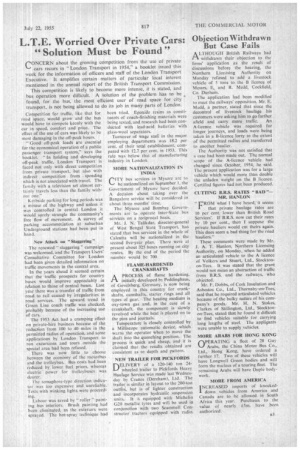L.T.E. Worried Over Private Cars: "Solution Must be Found"
Page 37

If you've noticed an error in this article please click here to report it so we can fix it.
CONCERN about the growing competition from the use of private cars recurs in "London Transport in 1954," a booklet issued this week for the information of officers and staff of the London Transport Executive. It amplifies certain matters of particular local interest mentioned in the annual report of the British Transport Commission. This competition is likely to become more intense, it is stated, and bus operation more difficult. A Solution of the problem has to be found, for the bus, the most efficient user of road space for city transport, is not being allowed to do its job in many parts of London.
Competition for traffic, like that for road space, would grow and the bus would have to compete keenly with the car in speed, comfort and price. The effect of the use of cars was likely to he most damaging in the off-peak hours.
"Good off-peak loads are essential for the economical operation of a public passenger transport system," says the booklet. "In holding and developing off-peak traffic, London Transport is faced not only with direct competition from private transport, but also with indirect competition from . spending which is not associated with travel. The family with a television set almost certainly travels less than the family without one."
Kerbside parking for long periods was a misuse of the highway and unless it was controlled in central London it would surely strangle the community's free flow of movement. A survey of parking accommodation at suburban Underground stations had been put in hand.
New Attack on "Staggering" The renewed staggering campaign was welcomed, and the Transport Users' Consultative Committee for London had been given detailed information on traffic movements in the central area.
In the years ahead it seemed certain that the traffic prospects for country buses would improve appreciably in relation to those of central buses. Last year there was a transfer of traffic from road to rail caused by irregularities in road services. The upward trend in Green Line coach traffic was checked, probably because of the increasing use of cars.
The 1953 Act had a cramping effect on private-hire business because of the reduction from 100 to 40 miles in the permitted radius of operation, and some applications by London Transport to run excursions and tours outside the special area had been refused.
There was now little to choose between the economy of the motorbus and the trolleybus. Bus costs had been reduced by lower fuel prices, whereas electric power for trolleybuses was dearer.
l'he semaphore-type direction indicator was too expensive and unreliable. Tests with winking lights were proceeding.
Labour was saved by " roller " painting bus interiors. Brush painting had
been eliminated, as the exteriors were sprayed. The hot-spray technique had
been tried. Epoxide resins as constituents of coach-finishing materials were being tested, and research had been conducted with lead-acid batteries with glass-wool separators.
Turnover of wage staff in the major employing departments was 18.2 per cent, of their total establishment, compared with 12.7 per cent. in 1953. This rate was below that of manufacturing industry in London.
MORE NATIONALIZATION IN
INDIA rill, bus services in Mysore are to
be nationalized on September 1. the Government of Mysore have decided. A decision about taking over the Bangalore service will be considered in about three months' time.
The Mysore and Bombay Governments are to operate inter-State bus services on a reciprocal basis.
Mr. J. N. Talikdar, director-general of West Bengal State Transport. has stated that bus services in the whole of Calcutta will be nationalized in the second five-year plan. There were at present about 325 buses running on city routes. By the end of the period the number would be 700.
FLAME-HARDENED CRANKSHAFTS APROCESS of flame hardening. initially developed by Peddinghaus, of Gevelsberg, Germany, is now being employed in this country for crankshafts, camshafts. starter rings and all types of gear. The heating medium is oxy-town gas and, in the case of a crankshaft. the component is slowly revolved while the heat is played on to the pins and journals.
Temperature is closely controlled by a Milliscope automatic device, which warns the operator when to move the shaft into the quenching position. The process is quick and cheap, and it is claimed that the results obtained are consistent as to depth and pattern.
NEW TRAILER FOR PICK FORDS NEW TRAILER FOR PICK FORDS DELIVERY of a 120-140 ton 24wheeled trailer to Pickfords Heavy Haulage Service was made last Wednesday by Cranes (Derehatn), Ltd. The trailer. is similar in layout to the 200-ton outfits. but is of lighter construction and incorporates hydraulic suspension units. It is equipped with Michelin G20 metallic tyres and will be used in conjunction with two Scammell Constructor tractors equipped with radio.




































































































